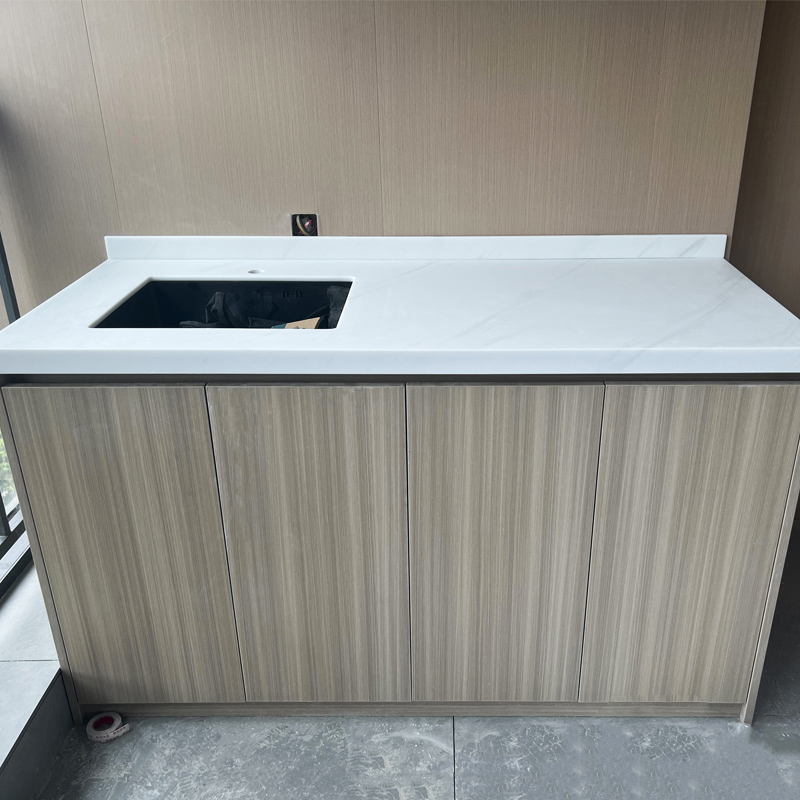
Acrylic Stone Sinks, also known as composite stone sinks, are premium bathroom and kitchen fixtures made from a blend of 80-85% natural minerals (typically quartz or granite) and 15-20% high-grade acrylic resins. This engineered material combines the aesthetic appeal of natural stone with enhanced durability and design flexibility. The manufacturing process involves mixing crushed stone with acrylic polymers under high pressure (2,500-3,500 psi) and temperature (150-200°C), resulting in a non-porous surface with a Mohs hardness rating of 5-6.
Key characteristics of Acrylic Stone Sinks include:
Material Composition: Typically 80% quartz/granite and 20% acrylic resin by weight
Density: 2.3-2.5 g/cm³, making them heavier than acrylic but lighter than solid stone
Water Absorption: <0.1%, significantly lower than natural stone
Thermal Stability: Withstands temperatures from -30°C to 180°C without damage
Impact Resistance: Can withstand 50-100 Joules of impact energy

Acrylic stone sinks offer exceptional durability with a flexural strength of 25-35 MPa and compressive strength of 120-150 MPa. The material's Vickers hardness (HV) ranges from 500-700, making it resistant to scratches from normal kitchen utensils (Mohs hardness ≤5). Laboratory tests show these sinks can endure 50,000+ cycles of standard use without significant wear.
The non-porous surface (pore size <0.1 microns) prevents liquid absorption, achieving 99.9% stain resistance against common household substances like coffee, wine, and oils. Chemical resistance tests demonstrate excellent stability against:
Acids (pH 2-5): No visible damage after 24-hour exposure
Alkalis (pH 8-11): No surface degradation after 72-hour exposure
Common cleaners: Resistant to 95% of household cleaning products
The antimicrobial properties of acrylic stone sinks inhibit bacterial growth by 99.6% compared to porous materials. Independent testing shows:
E. coli reduction of 99.4% in 24 hours
Staphylococcus aureus reduction of 99.2% in 24 hours
Mold growth prevention for 5+ years under normal conditions
Acrylic stone sinks exhibit excellent thermal characteristics:
Thermal conductivity: 1.5-2.0 W/m·K
Heat deflection temperature: 180-200°C
Coefficient of thermal expansion: 25-35 x 10⁻⁶/°C
The material can be molded into complex shapes with:
Minimum radius: 5mm for tight curves
Wall thickness: 12-20mm standard (can be customized)
Color consistency: ΔE <1.0 across production batches
Kitchen Sinks: Ideal for heavy-use areas with 10-15 year lifespan under normal conditions
Bathroom Vanities: Popular in master baths and powder rooms
Laundry Rooms: Resistant to detergent chemicals (pH 9-11)
Outdoor Kitchens: UV-stable versions available with 5000+ hours QUV resistance
Hotel Bathrooms: Withstand 200+ uses/day without wear
Restaurant Prep Areas: Certified for food contact (FDA 21 CFR 177.1460)
Medical Facilities: Meets ISO 22196 antimicrobial standards
Luxury Retail: High-end showrooms and designer spaces
Use pH-neutral cleaners (pH 6-8)
Wipe with soft microfiber cloths (300-500 GSM)
Rinse with water at 40-60°C for optimal cleaning
For organic stains: Paste of baking soda and water (3:1 ratio)
For mineral deposits: 10% vinegar solution (rinse after 5 minutes)
Avoid abrasive pads (scratch resistance ≥7 on the Mohs scale)
Apply sealant every 18-24 months (if required by manufacturer)
Check for mechanical damage annually
Professional polishing available to restore shine (using 3,000-5,000 grit compounds)
Use sink grids to prevent impact damage (>50J protection)
Avoid direct contact with hot pans (>180°C)
Install water softener if hardness exceeds 200 ppm
FAQ
What are Acrylic Stone Sinks?
Acrylic Stone Sinks are hand washing sinks made from a blend of acrylic resin and mineral fillers designed to provide the look and feel of natural stone with the benefits of light weight, durability and ease of maintenance.
What are the key benefits of Acrylic Stone Sinks?
The key benefits include: lightweight and easy to install, scratch and abrasion resistance, seamless joints, a wide range of color and design options, stain and bacteria resistance, and a relatively economical price.
How do I clean and maintain Acrylic Stone Sinks?
To clean Acrylic Stone Sinks use only mild soap and water, avoiding abrasive or strongly acidic cleaners. Wipe it regularly with a soft cloth to maintain its luster and appearance.
How heat resistant are Acrylic Stone Sinks?
Acrylic Stone Sinks are resistant to high temperatures, but it is recommended to avoid placing hot pans or other hot objects directly on their surface to prevent warping or damage.
Can Acrylic Stone Sinks be customized with colors and shapes?
Yes, many manufacturers offer customization options that allow customers to select colors, shapes and sizes as needed to meet personal style and design requirements.
Do I need a professional to install Acrylic Stone Sinks?
While some consumers can install them themselves, it is recommended that they be installed by a professional to ensure a good seal and prevent leaks.
How long do Acrylic Stone Sinks last?
If properly maintained, Acrylic Stone Sinks can last for many years, often reaching a lifespan of 10 years or more.
Are Acrylic Stone Sinks environmentally friendly?
Many Acrylic Stone Sinks are made from renewable materials and do not release harmful substances during use, so they can be considered an environmentally friendly option.
What types of locations are Acrylic Stone Sinks suitable for?
Acrylic Stone Sinks are suitable for home kitchens, bathrooms, commercial kitchens, hotels, restaurants and more, and are widely popular for their durability and aesthetics.